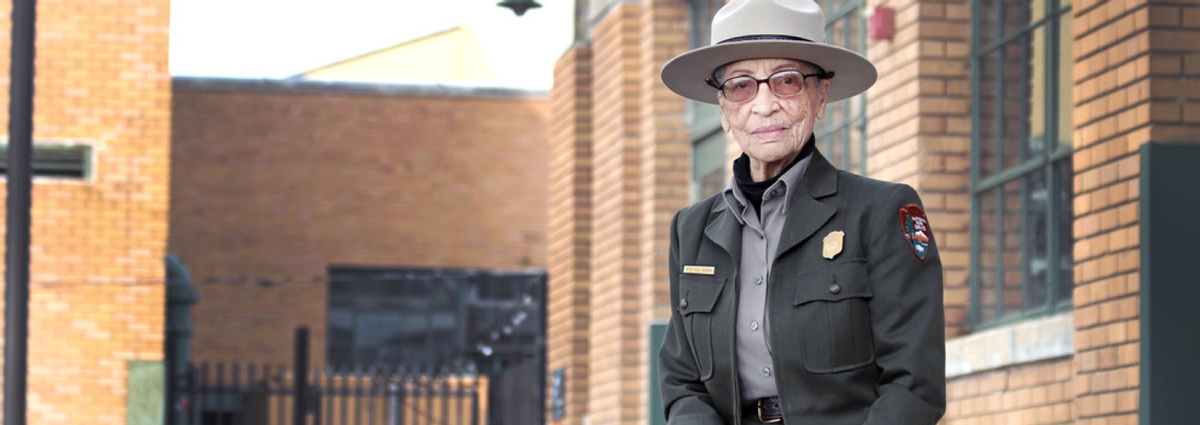Betty Reid Soskin helped to plan the Rosie the Riveter/World War II Home Front National Historical park, but it wasn’t until she became a Park Ranger at 85 years old that she saw fit to visit it.
“That was a white woman’s story,” Soskin told me in our recent talk at INFORUM at the Commonwealth Club. “The women in my family had been working outside their homes since slavery.”
When Rosie the Riveter was adopted as a cultural icon for women in the workforce in 1942, it took $47.25 per week to support a family of five — if you were white.
“But our fathers and our uncles were all members of the service workers generation, earning $25 to $35 a week. Pullman porters earned $18 a week, plus tips. So it had always taken two wages to support black families,” Betty said. “So it wasn’t that I was boycotting the Rosie story. It simply had nothing to say to me.”
Now at age 96, Betty is one of the few people living today who has borne witness to the history memorialized at the park. She gives talks there three times a week. But as an African American woman, she knows that what many consider to be the American narrative is only a fraction of the story.
“What gets remembered is determined by who is in the room doing the remembering.”
Being “in the room” has always been Betty’s way. She carries the untold stories of a century worth of enormous social shifts. And with such shifts, Betty told us, come periods of pain.
“We have to recognize in truths where we have been, because other than that we have no way to know how we got to where we are. Because we have been many nations over the years and some of them I’ve lived through some of them were not very comfortable.”
During the Civil Rights era, Betty’s family was one of the first African American families to move into a white neighborhood.
“The year that we moved into our house I had a third grader who was the only young African-American child in his school. And that year the PTA fundraiser was a minstrel show. And all of his teachers and the administrators were in blackface.”
Although the thought of watching her child’s teachers lampoon people who looked like her family may have made Betty want to hide away, she refused. She marched into the principal’s office to have a little chat about why minstrel shows are not okay.
“I said ‘I know that your show is tomorrow evening, and I can't possibly ask you to cancel it because it's too late now, but when you have your dress rehearsal tonight, explain my visit to you to your staff.’ And I said ‘tomorrow evening I will be here sitting in the front row.’ And I did go with my neighbor Bessie Gilbert. And we sat in the front row and cried all the way through it. But we made them do their minstrel show in our presence.”
Talk about being "in the room."
Betty went on to become a field representative for a member of the California State Assembly, which led her to help plan and develop the Rosie the Riveter/World War II Homefront National Historical Park. She was often the only one who carried the memories of segregation, internment and fatal industrial accidents in room full of people who chose to remember the popular American narrative of patriots coming together for the war effort.
It was then, at age 85, that Betty decided to become a ranger for the National Park Service. Now she can always be in the room to help museum visitors remember. She’s been going strong for the past 11 years.
There’s a sense of activism in acknowledging untold stories, even when the story isn’t pleasant, and even when the story makes us feel ashamed. Betty Reid Soskin sees National Parks as an integral part of reconciling the hidden stories with the rest of the American narrative so we can move ever closer to equality.
“It's now possible for us to visit almost any era in our history: the heroic places, the contemplative places, the scenic wonders, the shameful places and the painful places. In order to own that history — own it that we may process it — in order to begin to forgive ourselves in order to move toward a more compassionate future.”
Listen to the rest of Betty’s story — and the untold stories of a century worth of historical missteps and progress — in the latest episode of "Inflection Point."
And when you’re done, come on over to The Inflection Point Society, our Facebook group of everyday activists who seek to make extraordinary change through small, daily actions.
Hear more stories of how women rise up on "Inflection Point" on Apple Podcasts, RadioPublic, Stitcher and NPROne.

Shares